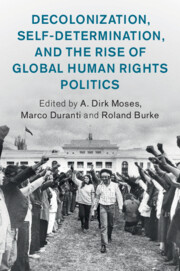Book contents
- Decolonization, Self-Determination, and the Rise of Global Human Rights Politics
- Human Rights in History
- Decolonization, Self-Determination, and the Rise of Global Human Rights Politics
- Copyright page
- Contents
- Notes on Contributors
- Acknowledgments
- Introduction
- Part I Anti-Colonial Struggles and the Right to Self-Determination
- 1 Seeking the Political Kingdom
- 2 Decolonizing the United Nations
- 3 The Limits of Humanitarianism: Decolonization, the French Red Cross, and the Algerian War
- 4 Connecting Indigenous Rights to Human Rights in the Anglo Settler States
- 5 Privileging the Cold War over Decolonization
- Part II Postcolonial Statehood and Global Human Rights Norms
- Part III Colonial and Neocolonial Responses
- Index
5 - Privileging the Cold War over Decolonization
The US Emphasis on Political Rights
from Part I - Anti-Colonial Struggles and the Right to Self-Determination
Published online by Cambridge University Press: 24 June 2020
- Decolonization, Self-Determination, and the Rise of Global Human Rights Politics
- Human Rights in History
- Decolonization, Self-Determination, and the Rise of Global Human Rights Politics
- Copyright page
- Contents
- Notes on Contributors
- Acknowledgments
- Introduction
- Part I Anti-Colonial Struggles and the Right to Self-Determination
- 1 Seeking the Political Kingdom
- 2 Decolonizing the United Nations
- 3 The Limits of Humanitarianism: Decolonization, the French Red Cross, and the Algerian War
- 4 Connecting Indigenous Rights to Human Rights in the Anglo Settler States
- 5 Privileging the Cold War over Decolonization
- Part II Postcolonial Statehood and Global Human Rights Norms
- Part III Colonial and Neocolonial Responses
- Index
Summary
The Universal Declaration of Human Rights (UDHR), approved by the UN General Assembly in December 1948, advanced the revolutionary idea that all human beings were entitled to the same basic rights regardless of “the political, jurisdictional or international status of the country or territory” in which they dwelled. This meant that it extended to the 700 million people – almost a third of the world’s population – who in 1948 called the dozens of dependent territories home and injected human rights into the larger issue of decolonization of the Western colonial empires. The UDHR won approval without a dissenting vote, though eight nations, including the six members of the Soviet bloc at the United Nations – the Soviet Union, Byelorussia, Czechoslovakia, Poland, Ukraine, and Yugoslavia – abstained.
Keywords
- Type
- Chapter
- Information
- Publisher: Cambridge University PressPrint publication year: 2020

